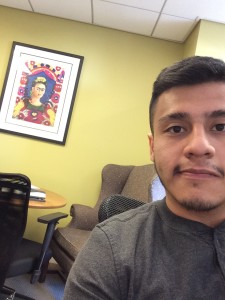The silence of a family that crossed the border and must avoid detection. The silence and elements of a poem the immigrant son negotiates in his work. This is a short interview with poet Ricardo Hernandez, but it will stay in your heart. Hear him read on Sunday, Nov. 18th at “What Just Happened: Writers Respond to Our American Crises” from 6-8pm at Silvana in Harlem with Ibrahim Abdul-Matin, Judith Baumel, Tanya Domi, Max S. Gordon, Ruby Shamir, and Vanessa K. Valdés!
 In the very first line of your bio, you tell us you’re the son of Mexican immigrants. Tell us what your family experience, in this country, has meant for you and your writing. After crossing the border in ‘97, my family and I operated within a silence likely familiar to most undocumented folks: keep your gaze down; smile, but try not to speak; don’t ever make waves—the primary concern being, of course, avoiding detection. Even within our own home the code was enforced, and we never really discussed our fear of deportation. (Why, I’m still not sure, but it’s hard not to recognize it as a form of self-defense, as repression often is.)
In the very first line of your bio, you tell us you’re the son of Mexican immigrants. Tell us what your family experience, in this country, has meant for you and your writing. After crossing the border in ‘97, my family and I operated within a silence likely familiar to most undocumented folks: keep your gaze down; smile, but try not to speak; don’t ever make waves—the primary concern being, of course, avoiding detection. Even within our own home the code was enforced, and we never really discussed our fear of deportation. (Why, I’m still not sure, but it’s hard not to recognize it as a form of self-defense, as repression often is.)
In hindsight, I see similarities between that brand of silence and elements most poetries negotiate: silence; breath; an understanding of the value and menace of utterance. “Restrained” is how my MFA cohort often (lovingly) describes the language in my work, and I posit my and my family’s experience is tied to that: I grew up learning every word must be scrutinized, appraised for what it might elucidate and/or endanger.
Of course, it’s not all doom and gloom. Engaging with other writers, other poets, seeing how they envision their own writing has, in recent months, provided models of how I might reimagine my relationship to the medium. “It is a function of poetry to locate those zones inside us that would be free and declare them so,” wrote the late C.D. Wright. I wholeheartedly agree.
Is there a poem– yours or someone else’s–that really speaks to your experiences these days? I’m a circuitous reader, revisiting the same four or five poems from the same poet for long (and I mean LONG) stretches of time; long-distance apprenticeships, is how I’ve come to imagine it. At the moment, Rita Dove’s Horse & Tree is orbiting my mind (and I urge you to listen to her reading it online). I’m in awe of its deftness, its clarity, how it manages to explain life (but really, aging and death) without razing the reader.
I lost someone recently, and I’ve been trying to understand that loss as best I can. This poem helps.
When do you feel most “we”? When do you feel most “I”? The most we: with other writers, other poets. At this moment, that means amongst my MFA cohort, whether that be in workshop/class, at a bar after workshop (shout-outs to Veronica), or just sharing birth charts and candids in group texts.
The most I: commuting. The subway always feels like such a lonely domain.
